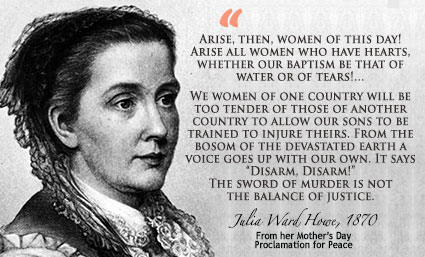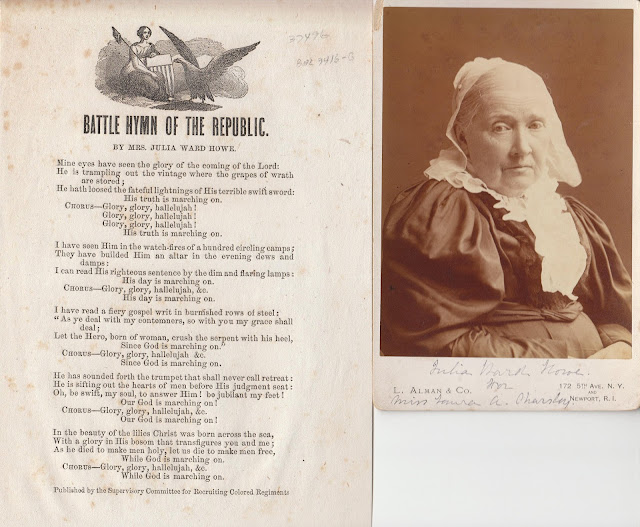Story of Julia Ward Howe there are a few words which portray the identity of Julia
Ward Howe, yet they all bomb in their individual limit or even in their group
may to characterize the striking lady as she seemed to be. The world knows Ms
Howe as an author, artist, dramatist, writer, travel essayist, reformist,
women's activist, club lady. She was altogether come in one and considerably
more.
She was a gushing mother, a friendly spouse and capable
speaker as well. In any case, Julia Ward Howe will dependably be respected for
her commitments in giving pride to ladies and parenthood. She was the primary
lady who battled for the official festival of Mother's Day in US. In her
different social limits Julia indefatigably worked for equity for the duration
of her life. She battled forcefully for the lady's entitlement to vote and
attempted to free ladies from the conventional bounds of home. Aside from this,
she is eminent as the creator of the renowned tune, 'The Battle Hymn of the
Republic'.
Julia Ward Howe: Childhood
Miss Julia Ward Howe was conceived in New York City on May
27, 1819 as the third of the six youngsters to Julia Rush Cutler and Samuel
Ward, a rich investor. Julia learnt French, Italian, German, Latin and Greek
other than being guided in writing, science and arithmetic. She started an
adventure of self instruction after the age of sixteen. Julia started her
written work profession at 20 years old when she composed an abstract feedback
which was distributed namelessly in the Literary and Theological Review and the
New York Review.
Julia lost her mom when she was just five. She in this
manner went under the impact of her defensive and religious father. All things
considered Julia had her offer of happiness and mingling. She turned out to be
to a great degree prominent for her pretty looks and resonant voice
Julia confronted more tragedies in the passing of her dad in
the year 1839 and progressive downfall of a sibling and a sister-in-law. These
individual tragedies influenced Julia to look for comfort in religion.
Julia Ward Howe: Marriage
In one of her visits to New England Institute for the Blind
(later the Perkins Institute) Julia came to meet Samuel Gridley Howe,
reformist, who was dynamic in abolitionism and was the guide of Laura Bridgman,
the skilled visually impaired, hard of hearing quiet understudy. She was awed
by Howe however he was eighteen years her senior and endured various
impediment. Inspite of a few second thoughts, the two got hitched in April,
1843.
Do you know ANNA MARIE JARVIS ?
Issues surfaced at a very early stage in their marriage when
Julia found that Howe put her after his work and shut male companions. She
started to feel smothered in her marriage. All the more so when she found that
Howe did not take any interests in her written work professions and regularly
disheartened her from seeking after her scholarly advantages.
The Howes first youngster was conceived in 1844 in Rome. The
couple had five kids in twelve years. A 6th, conceived later, kicked the bucket
in early adolescence. The family later moved to Boston. This ended up being a
radical change for Julia. She now felt more opportunity and delighted in
collaborations with individuals and companions. The Howes remained in the house
named 'Green peace' by Julia in the vicinity of 1846 and 1864.
Throughout the years, the wedded existence of the couple
weakened. Samuel started to be discourteous to Julia and controlled her legacy.
The two even considered separation, yet Julia surrendered the idea when Howe
requested the guardianship of two of their kids. This as indicated by Julia was
her "most noteworthy yield".
Sometime down the road, in any case, strains between the
couple were disintegrated. Howe started to be acknowledge Julia work and
acknowledged his conjugal transgressions. Julia's history of her significant
other, 'Journal of Dr. Samuel Gridley Howe', is brimming with applaud for his character
and accomplishments.
Julia Ward Howe: Literary Work
Julia distributed two compilations of lyrics in 1848 much to
her spouses disappointment. Notwithstanding, Julia got the chance to work with
her better half for a brief span in 1853 when he altered an abolitionist
subjugation diary, 'The Commonwealth'. Julia contributed social and artistic
feedback to the diary.
Julia's household despondency were featured in a gathering
of sonnets titled, 'Energy Flowers'. Despite the fact that the book was
distributed namelessly, the writer's character turned into an open mystery.
Julia Ward Howe concocted another accumulation of sonnets, 'Words for the Hour'
in 1857. Her play, 'The World's Own' was performed in New York and Boston. Her
report of an excursion to Cuba was distributed in the New York Tribune in 1860.
It was on an outing to Washington, when the Howes went to
watch a Union armed force audit which was abruptly scattered by a Confederate
assault. On their way back Howes alongside the others started to sing energetic
tunes. James Freeman Clarke, an individual from the gathering recommended to
Julia that she compose new and better verses for the tune of "John Brown's
Body". In the lodging room, that very night, Julia Ward Howe composed the
words to the well known Civil War melody, "The Battle Hymn of the Republic".
"Mine eyes have seen the wonderfulness of the happening
to the Lord;
He is trampling out the vintage where the grapes of fury are
put away;
He hath loosed the pivotal lightning of His shocking quick
sword;
His reality is walking on.
Eminence! Brilliance! Glory be! Greatness! Greatness! Thank
heaven!
Eminence! Brilliance! Glory be! His reality is walking
on."
The melody was distributed by The Atlantic in February,
1862. Julia was paid $5 for the same. Before long the melody got and cleared
the North. The Battle Hymn of the Republic, turned into a motivation to Union
warriors battling against servitude and is currently the national song of
praise for opportunity.
Julia Ward Howe:
Social Activism
Amid the 1850's Julia went under the impact of William
Lloyd's abolitionist bondage gathering. She alongside her significant other
worked with the Sanitary Commission when the war broke out.
In 1868 Julia Ward Howe established the New England Woman's
Club alongside Caroline Severance. She likewise started to go to gatherings of
New England Woman Suffrage Association and filled in as its leader, 1868-77 and
1893-1910. In 1869 she and Lucy Stone drove the development of the American
Woman Suffrage Association. She additionally directed the Massachusetts
Suffrage Association, 1870-78 and 1891-93 and made huge commitments to the
Woman's Journal established by Lucy Stone. These exercises changed the
standpoint of Julia. She came to ponder womanhood.
Amid the Franco-Prussian war in the 1870s, Julia started a
one-lady peace campaign and made an energetic "advance to womanhood"
to ascend against war. She interpreted her effective Mothers Day Proclamation
(written in 1870, Boston) into a few dialects and circulated it broadly. Julia
Ward Howe likewise went to London in 1872 to advance a worldwide Woman's Peace
Congress. In Boston, she started a Mothers' Peace Day recognition on the second
Sunday in June and held the meeting for various years. She thoroughly
championed the reason for official festival of Mothers Day and statement of
authority occasion on the day. Her thought was broadly acknowledged however was
later supplanted by the Mother's Day occasion now celebrated in May.
Julia made broad address visits and composed ladies' clubs
wherever she went. In 1893, gave an address at the World Parliament of
Religions in Chicago, titled "What Is Religion?" In 1908 Julia Ward
Howe turned into the primary lady to be chosen to the American Academy of Arts
and Letters.
Julia Ward Howe passed on October 17, 1910. An expansive
number of individuals came to pay their last regards to the spearheading lady
in writing at the administrations held at Church of the Disciples and at
Symphony Hall. Various memoirs are composed on Julia Ward Howe and her name
likewise shows up in the 'Striking American Women' and 'American National Biography'.













0 comments:
Post a Comment